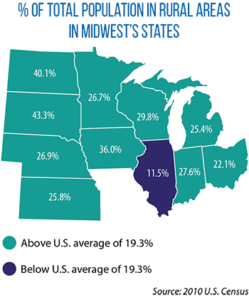Iowa legislation aims to boost rural development for entire state’s economic benefit
In Iowa, Gov. Kim Reynolds has made improving economic opportunities to all areas of the state a top priority. To do this, she has placed a particular focus on rural Iowa and the challenges faced by those communities.
 Since 2018, state and community leaders have taken part in the governor’s Empower Rural Iowa Initiative in order to address the challenges facing the state’s rural communities. The initiative’s work resulted in legislation and a set of recommendations for continued action.
Since 2018, state and community leaders have taken part in the governor’s Empower Rural Iowa Initiative in order to address the challenges facing the state’s rural communities. The initiative’s work resulted in legislation and a set of recommendations for continued action.
Sixty percent of Iowans live in counties with populations less than 100,000 and 30 percent live in counties with less than 25,000, making rural Iowa critical to the entire state, says Iowa Sen. Mark Lofgren.
“It is rural Iowa that has made us what we are today,” says Lofgren, who is a member of the initiative’s task force and chair of the Senate Appropriations Subcommittee on Economic Development.
“Much of the industry in the larger counties depends on connections with rural counties,” he says. “Rural counties offer a low cost of living and many economic opportunities that are not available in large cities.”
Like many rural areas across the region, rural Iowa is challenged with slow economic growth, job loss and declining populations. Last session, legislators approved, and Gov. Kim Reynolds signed, the Empower Rural Iowa Act (HF 772) as an initial step to address these issues.
The act focuses on improving workforce housing, broadband connectivity and local leadership in rural communities. It provides $25 million to fund workforce housing credits and $5 million in grants to increase broadband access.
In addition, it creates the Center for Rural Revitalization, which will help communities create a vision and roadmap for Main Street economic improvements.
These areas need the state’s attention to help attract and keep businesses in smaller towns across the state, Lofgren says.
“Much of the housing stock in rural counties is older and not as updated as potential new residents would like,” he adds. “Internet connectivity in many rural areas is not sufficient for the needs of residents and businesses.”
The Empower Rural Iowa Initiative will also address a community leadership void that has arisen as businesses have left small towns by providing a pathway for local engagement and strategic planning, Lofgren says. Late last year, the Empower Rural Iowa Task Force adopted a set of final legislative recommendations for the 2020 session. Among them:
- Provide additional funding and a higher state match for existing broadband grants to improve internet speed in rural areas.
- Increase the cap for Main Street Challenge grants, which assist communities in making economic and physical improvements to Main Street districts.
- Increase funding for the state’s derelict-buildings grant program.
- Provide more rural set-aside money for the state’s building remediation program.
- Continue set-asides for small cities in the state workforce housing tax credit.
- Create a matching grant program focused on developing rural leaders.
- Continue support for Rural Innovation Grants and Rural Housing Assessments created in 2019.